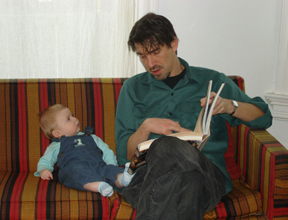Getting to Know AK: Charles Weigl
[Editor’s Note: Charles Weigl is a long-standing member of the AK collective. We post this brief, autobiographical statement from him in order to share some of the reasons why we’re glad he’s here, and to help readers of this blog learn more about those who enable AK to function from day-to-day. We plan to publish biographies of other collective members in the near future.]
* * *
 My exciting career in anarchism started in the New York punk scene in the late 1970s. I spent long hours in the library researching all the “anarchy” stuff I kept hearing about in lyrics and liner notes. Along with Marx, who a high school teacher turned me on to, anarchism helped my teenaged self make sense of the world in which I grew up: a rapidly decaying working-class area on the north shore of Staten Island. Third generation born in the same neighborhood, I was raised more or less in the shadow of the Rheingold brewery where my grandfather worked for forty years. By the time I came along, the neighborhood was sinking fast. The shipyards had mostly closed by the time I was born, the brewery some years later—both departing for sunnier, non-union climes. Anarchism gave me a framework for understanding the resulting ravages.
My exciting career in anarchism started in the New York punk scene in the late 1970s. I spent long hours in the library researching all the “anarchy” stuff I kept hearing about in lyrics and liner notes. Along with Marx, who a high school teacher turned me on to, anarchism helped my teenaged self make sense of the world in which I grew up: a rapidly decaying working-class area on the north shore of Staten Island. Third generation born in the same neighborhood, I was raised more or less in the shadow of the Rheingold brewery where my grandfather worked for forty years. By the time I came along, the neighborhood was sinking fast. The shipyards had mostly closed by the time I was born, the brewery some years later—both departing for sunnier, non-union climes. Anarchism gave me a framework for understanding the resulting ravages.
My work history is all over the place—truck driver, furniture mover, bartender, cabbie, office drone, professor, editor, freight elevator operator—but anarchism has been a constant part of my life, since I first learned about it. AK is the third anarchist “job” I’ve had, in the sense of being lucky enough to find a way to develop and spread anarchist ideas while earning a little to help pay the rent.
In the mid-eighties, I taught at Tolstoy College, an anarchist academic unit at the State University of New York/Buffalo. Yes, that’s right: anarchists receiving salaries from a state university (courtesy of a student strike fifteen years earlier that demanded, among other things, that SUNY fund an anarchist college). Unfortunately, I was the last instructor hired and Tolstoy College folded soon thereafter. From 1987 to 1990, I was part of the Left Bank Books collective in Seattle…which is still going strong.
My political activity is about as varied as my work history. It started with opposing draft registration in the 1970s. Since then, I’ve worked on everything from Central American solidarity issues, to housing struggles, to the successful unionization of graduate student employees at SUNY.
I’ve been part of AK Press for almost six years, first as a volunteer, then as full-time collective member. Soon after I moved to the Bay Area, I showed up at the famous (to me at least) AK warehouse to volunteer and was put to work editing manuscripts and transcribing lectures. More than half a decade later, I can honestly say that being at AK has involved some of the hardest and most fulfilling work I’ve ever done. It ain’t easy keeping the presses rolling, but it’s been wonderful being part of such a vitally important project. Anarchists have always been big on publishing propaganda, but one difference between today and, say, 1917 or 1936 is the huge potential for communication in various forms. If we don’t want to make the same mistakes we’ve historically made, if we want to deepen and expand the existing anti-authoritarian elements within the broader left and help move it in a more revolutionary direction, we need to get historical, theoretical, and practical information into as many hands as possible. At no other time in history has it been possible to let so many people know what anarchism means, to strengthen and sharpen the discussion among people who already accept that label, and to help the wider “movement” avoid the authoritarian and electoral traps that have crippled it in the past.
I hope to continue my association with AK Press well into my (rapidly approaching) old age.
PS: The little guy in the photo is my son, Sasha.
